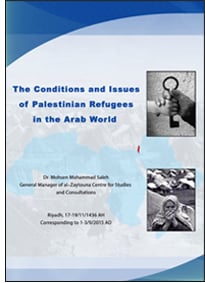 Al-Zaytouna Centre publishes a paper entitled “The Conditions and Issues of Palestinian Refugees in the Arab World,” authored by Prof. Dr. Mohsen Mohammad Saleh, associate professor in Palestinian Studies.
Al-Zaytouna Centre publishes a paper entitled “The Conditions and Issues of Palestinian Refugees in the Arab World,” authored by Prof. Dr. Mohsen Mohammad Saleh, associate professor in Palestinian Studies.
The paper was presented in the conference “Refuge and the Security, Political and Social Dimensions” that was organized by Naif Arab University for Security Sciences in collaboration with the Office of the United Nations High Commissioner for Refugees, held in Riyadh, KSA, on 17-19 / 11/1436 AH corresponding to 1-3 /9/2015 AD.
Summary:
The issues of Palestinian refugees emerged in the wake of the Arab-Israeli war in 1948, when the Zionist gangs, which created Israel on around 77% of the land of Palestine, forcibly displacing around 800 thousand Palestinians, or 57% of the total population of Palestine at the time. The problem of the refugees grew worse when Israel occupied the remainder of Palestine in the war of 1967, where around 300 thousand Palestinians were displaced.
The issue of the Palestinian refugees is the most prominent refugee crisis in terms of the number of refugees per capita of the total population. Furthermore, it is the longest-lasting refugee crisis in modern history and has yet to be resolved, more than 67 years later. The Palestinian refugee question has also drawn the highest number of international resolutions, with resolution 194 regarding the right of return for Palestine refugees being reaffirmed more than 120 times.
More than half of the Palestinian people live outside historical Palestine. More than 88% of Palestinians in the Diaspora live in Arab countries, the natural host for the Arab Palestinian people. Palestinian refugees are concentrated in the countries bordering Palestine, with up to 80% of Palestinian refugees in the Arab world living in Jordan, Syria, and Lebanon. A large number of Palestinians also live in the Arab Gulf countries, particularly the Kingdom of Saudi Arabia (KSA).
The Palestinian refugee question in the Arab world has taken on national, nationalist, Islamic, and humanitarian dimensions. The Arab countries have borne their share of the burden of liberating Palestine, supporting the Palestinian people, and working for the return of the refugees. At the same time, the refugees issue took on political, economic, social, and security dimensions: In addition to the political and economic burdens borne by the Arab host countries, the Palestinian people’s quest for return and liberation, and their adoption of armed struggle, led to a lot of friction and conflict in the host countries, especially those that border Palestine. These countries sought to crackdown on Palestinian action in accordance to their vision to their national interests and security needs.
The policy of the Arab regimes in dealing with the refugees ranged from giving them full citizenship rights like in Jordan, to complete denials of all civil rights like in Lebanon. Some Arab regimes tried to take political and military advantage of the presence of Palestinian refugees in their territories, and of the difficulty of their conditions and needs. In other cases, the Palestinians fell victim to internal, local, or inter-Arab disputes. A number of countries, meanwhile, had a net gain from Palestinian refugee presence, where Palestinians had important roles in their development and renaissance.




Leave A Comment